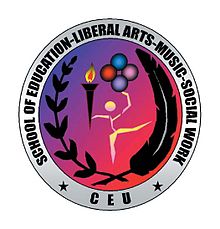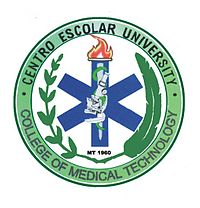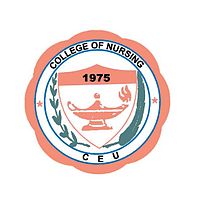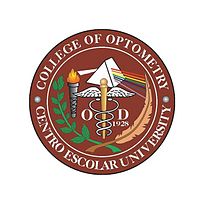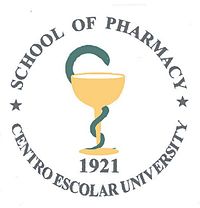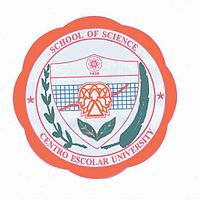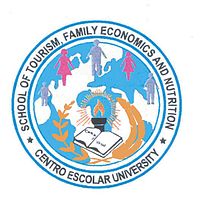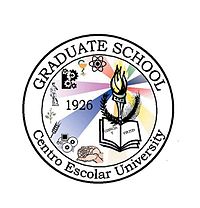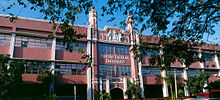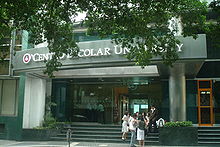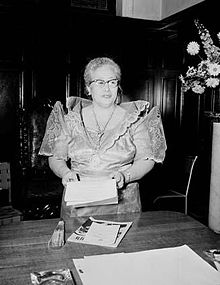- Centro Escolar University
-
Centro Escolar University Pamantasang Centro Escolar 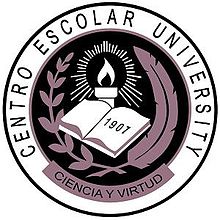
Motto Ciencia Y Virtud (Science and Virtue) Established June 3, 1907 Type Private, Non-Sectarian President Ma. Cristina D. Padolina,Ph. D.[1] Undergraduates Approx. 25,000 Location Manila, Metro Manila, Philippines Campus Urban (4 Campuses: Mendiola, Malolos, Makati CBD [including Puyat Ave. and Legazpi Village campuses]) Hymn Imno ng Pamantasang Centro Escolar (Centro Escolar University Hymn) by Alfredo S. Buenaventura Colors █ Pink and █ Grey Nickname Escolarians, Escolarina, Escolarino Mascot  CEU Scorpions
CEU ScorpionsAffiliations IAU, ASAIHL, among others. Website ceu.edu.ph Centro Escolar University (PSE: CEU) (Filipino: Pamantasang Centro Escolar) is a private university in the Philippines. It was founded on June 3, 1907 by two women, Librada Avelino and Carmen de Luna, and was originally called Centro Escolar de Señoritas. It became a university in 1933. Today, the university has three campuses, the main campus is the Mendiola Campus in Manila, the Malolos Campus established in 1978 is in the northern suburb of Malolos City in Bulacan province, and the newly established Makati Campus in 2005, is in the Makati Central Business District. Originally, its Parañaque Campus was part of the university's system until it was phased out in the early 1990s.
The university offers programs in the arts, humanities, sciences, and allied medicine. CEU also has dentistry and pharmacy programs. All of its academic programs are accredited Levels 2 and 3 by the Federation of Accrediting Agencies of the Philippines. CEU is the first university in the Philippines to be given an ISO:9001 certification on its campuses.[citation needed] It was granted full autonomy status by the Commission on Higher Education.[citation needed] The university is listed on the Philippine Stock Exchange with the stock symbol, CEU. The university celebrated its centennial in 2007.
Schools, Colleges and Academic Programs
Integrated School (1907–2004) The original academic program of the university, the Integrated School's elementary and high school programs opened in 1907. The programs were closed in its Mendiola Campus in the mid-1990s and formally phased out in 2004 in its Malolos campus. The last batch of its elementary and high school students were from its Malolos Campus in 2004 and 2001 respectively.
School of Accountancy and Management
The School of Accountancy and Management is the third largest college in terms of student population in the university system.[citation needed] It offers bachelor's degrees in Accountancy, Management Engineering, Business Administration major in Banking and Finance, Marketing, Human Resource Development Management, Financial Management, Marketing Management, Operation Management and Entrepreneurship.
SAM, originally known as the College of Business, then later as the College of Commerce and Secretarial Administration (COMSEC), College of Accountancy, Commerce and Secretarial Administration (ACS) and recently, the School of Accountancy, Business, Secretarial and Public Administration (ABSP), started as a two-year secondary commercial course for girls. In 1928, a four- year college course was offered under the College of Liberal Arts, leading to the degree of Bachelor of Science in Commerce, as well as a two-year Associate in Commercial Science course and a one-year secretarial course.[citation needed]
School Organizations
Centro Escolar Marketing Society (CEMARS)
CEMARS aims to advance the interests and welfare of marketing students. It promotes the appreciation of marketing as a business tool. It renders educational assistance to students in the marketing discipline. It designs program and activities for students.
Junior Financial Executive of the Philippines
JFINEX is open to all Banking and Finance students. It aims to upgrade the effectiveness and importance of Banking and Finance as a subject in the school. and to adopt measures that foster educational advancement in the field of finance.
Junior Philippine Association of Secretaries (JPAS)
The JPAS fosters educational advancement in the field of secretarial education and administration. It serves as an instrument for exposure of students to actual practice in secretarial and office life.
Junior Philippine Institute of Accountants (JPIA)
The JPIA seeks to create an academic atmosphere conducive to the educational advancement of students in the field of accountancy. It sponsors activities that provide exposure of students to the actual practice of accounting in business life.
Management Students' Association (MASA)
MASA is an organization of management students in CEU. It promotes management as a field of study. It runs activities that promote the practical application of management theories and practices.
School of Dentistry
Established in 1925, the Centro Escolar University School of Dentistry provides solid ground in the essentials of Dental Medicine.
COURSES OFFERED
Dentistry - A 6-year Dentistry course (2 years Preparatory Dentistry and 4 years Dentistry Proper) leading to the degree of Doctor of Dental Medicine\
Master of Science in Dental Education
Liberal Arts, Education, Music and Social Work
The School of Education, Liberal Arts, Music and Social Work (SELAMS) merged in the late 1990s to integrate the four major departments of the university.[citation needed] The Education Department offers Bachelor's degrees in Secondary and Elementary Education with nine majors. The Liberal Arts department offers degrees in Mass Communication, Language Arts, Economics and Political Science. The Conservatory of Music offers Bachelor of Music degrees in seven majors namely Music Education and Applied Music in Composition, Conducting, Guitar or String, Piano, Voice, Percussion, and Wind instruments. Meanwhile the school's Social Work department offers bachelor's degree in Social Work.
Ms. Barbara Saile, BS Social Work cum laude of batch 2009 took the first place in the June 2009 Social Workers' Licensure Examination with an average of 86.00%
Medical Technology
The College of Medical Technology offers the bachelor's degree in Medical Technology. It is the first school in the Philippines to integrate the Emergency Medical Technician program in its curriculum. The school is also the only school in the Philippines to be accredited as a drug-testing facility.[citation needed]
The College of Medical Technology, established in 1960, was the first of its kind in the country.[citation needed]
Nursing
Founded in 1975, the College of Nursing offers Bachelor's and Master's degrees in Nursing.
Students at the College of Nursing learn the principles and practice of Nursing as they are seconded to tertiary hospitals and communities around the metropolis during their practicum.
In response to the current educational needs, Centro Escolar University established the College of Nursing in June 1975 with the program Bachelor of Science in Nursing, a 5-year program with Dean Ida Kimseng. This is to answer the demand committed and better quality of nurses to meet the health needs of the Philippine society in both urban and rural orientations. It has a well-planned academic and professional activities and experiences to provide students with opportunities to be involved in rendering total quality nursing care to people in various settings: hospitals, community and other related agencies.
The College of Nursing had a starting population of 524 students during the first semester of the school year 1975-1976 and a population of 533 on the second semester of the same year. The population doubled on the 2nd year of College of Nursing with a population of 1,001 on its 1st semester.The expansion of University facilities addressed the increase in population of the College.
In 1975-1980, the 1st Nursing Arts Laboratory was established at Margarita Oliva Hall (MOH). It was a classroom with basic nursing equipment that the student utilized for Related Learning Experiences to enhance their basic skills. In 1979, the college had its first batch of graduates.
In 1986-1990, another Nursing Arts Laboratory at Generosa De Leon Science Center was constructed and new beds and mannequins were acquired. An amphitheater style gives the students a view of nursing demonstration procedures.
At that time, there were 18 affiliated hospitals, 5 lying –in centers, 37 health centers and 7 communities and the highest board passing rate of 95%
The University commitment to academic excellence led to the accreditation of the College of Nursing and Social Work with the Philippine Accrediting Association of the Schools, Colleges and Universities (PAASCU). The preliminary survey happened on February 18 and 19 year 1988 and the initial formal survey was conducted on February 15 and 16 year 1990.
The 4-year Nursing Curriculum started in 1980-1984. In 1984, the competency-based and community-centered curriculum was implemented. Throughout the 4-year program, the teaching learning activities resolve around the promotion of health, prevention of illness, rehabilitation with the community as its client.
During the leadership of Dean Angelina Lin, the increase in the population led to the expansion of the facilities in the University and the innovation of the Curriculum to meet the global demand.
In 1991-1995, the Nursing Arts Laboratories at the 2nd and 3rd floor at the Librada Avelino Hall were constructed to accommodate the increasing enrollees of the College of Nursing.
The College of Nursing was able to achieve the highest rating of 98.29% National Board Passing Rate. On the November 1996 Board Exam, the CEU College of Nursing was recognized as a Top Performing School with a 94% rating.
In 1998-1999, the new curriculum for the Associate Health Science Education (AHSE) was implemented by the virtue of CHED Memorandum Order No. 27 of 1998. In this curriculum, all general education subjects offered for Baccalaureate degrees lead to the health profession. After the two-year AHSE program, graduates are expected to be equipped with the knowledge, skills and attitude to function as primary health care provider.
In 2000 and at present, Dean Merlina V. Locquiao was appointed as the third dean of the College with the commitment to high level of quality nursing education and nursing practice in the global community.
It was on the 2nd semester of the school year 1999-2000 when the college of Nursing got its lowest number of enrollees with a population of 289. On the 1st semester of the school year 2005, the College of Nursing achieved its highest number of enrollees, with a population of 3,758, since the implementation of the AHSE Program from 1975-2005.
The students are enrolled for two years as Associate Health Science Education (AHSE) students. After graduation from the AHSE program, they will enter the BSN curriculum which requires them to finish another two years being BSN student.
At present the curriculum under the CMO No. 14 Series of 2009 (Policies and Standards for Bachelor of Science in Nursing Program) captures the whole new concept of the nursing profession to produce the most competent and highly competitive nursing graduates in the country. It focuses on the core values of caring as the core of nursing and 11 key areas of responsibility as competencies that a nurse should perform.
On the December 2002 Board Examination, the College of Nursing achieved 93% passing rate that elevated it as one of the top performing schools in the Nursing Board Examination in 2006 -2008 for more than 200 examinees and second top performing school for 1000 examinees in 2009 to 2010.
A team of eight (8) accreditors together with the Executive Director of PAASCU visited Centro Escolar University for a re-survey of the College of Nursing programs on August 9–10, 2000.
Since the establishment of the College of Nursing, community outreach programs have been part of the College activities in collaboration with the University activities. The community immersion program started in 1998 on a partnership with the adopted municipality of Naic, Cavite and presently it has expanded to the municipalities of Ternate in Cavite, Sto. Tomas, Malvar, and Laurel in Batangas in order to deliver the primary health care services to the community people.
For almost 35 years, the CEU College of Nursing remains to be stable and further strive for excellence because of the dedication and hard work of the Deans, faculty, students and the administration.
Optometry
The College of Optometry offers a six year program leading to the Doctor of Optometry degree. CEU's College of Optometry has been got the majority of the top places in the annual Board Examination for Optometry, and has an enrolment bigger than those of all other optometry schools in the country put together.[citation needed]
Pharmacy
The first tertiary academic program of the university is the Bachelor's degree in Pharmacy.Today, the college is known as the School of Pharmacy. It currently offers bachelor's, master's and doctorate degrees in Pharmacy.Year 2011 it was accredited to level IV.
The College of Pharmacy was the first college established by CEU in June 1921. In 1929, the 3-year course was extended to 4 years leading to the degree of Bachelor of Science in Pharmacy. The CEU College of Pharmacy was granted a Government Recognition No. 32, Series of 1946 on February 27, 1946. Twenty-six years later, the B.S. Pharmacy degree required 5 years of study, but in 1984, the B.S. Pharmacy course was reverted to four years. In February 1999, it was elevated to the School of Pharmacy to include supervision of MS Pharmacy and PhD in Pharmacy programs. BS Pharmacy was opened in the CEU Malolos campus in June 2001 while BS Pharmacy and Pharm.D. (Doctor of Pharmacy) Program were offered in CEU Makati campus in June 2005.
Master of Science in Pharmacy opened in November 2008 at the Malolos campus.
The CEU College of Pharmacy was chosen as the pilot school to undergo the Philippine Association of Colleges and Universities Commission on Accreditation (PACUCOA) Accreditation for Pharmacy.[citation needed] The College was granted the Level 1 status on September 4, 1989, the Level II status in 1992, re-accredited Level II Status on February 1995, and 2nd re-accredited Level II Status in April 1999 and the 1st School of Pharmacy granted the Level III status, the highest in the Philippine Education System in December 2000. Today, the Centro Escolar University School of Pharmacy was granted the Level IV status, the highest accredited school of pharmacy in the Philippines.[citation needed]
It has been a founding member of Philippine Association of the Colleges of Pharmacy (PACP) since 1965. It is a founding member of the Asian Association of Schools of Pharmacy (AASP) in April 2001.
Organizations
Junior Philippine Pharmaceutical Association
The JPPhA - CEU Chapter is the organization of the Pharmacy students in the campus. It gained university recognition in 1996. Its objectives are the promotion of educational advancement in the field of Pharmacy education and administration and providing students with exposure to actual practice of specializations in pharmacy. It is a member of the Federation of Junior Chapter, Philippine Pharmaceutical Association (FJCPPhA).
Federation of Junior Chapters of the Philippine Pharmaceutical Association
CEU-School of Pharmacy is the Beta Chapter of FJCPPhA and composed of twenty-two schools nationwide. The members of the organization are associate members of the Philippine Association of Colleges of Pharmacy (PACOP) and the Philippine Pharmaceutical Association (PPhA). It upholds ethical and professional standards, defends and protects rights of members, and foster relationship between pharmacists and the public. It organizes visits to pharmaceutical laboratories, industrial concerns, educational films, expositions, lectures, seminars, programs, and greater participation in the activities of the Philippine Pharmaceutical Association.
Dean
Dr. Olivia M. Limuaco, BS Pharm., MS Pharm., Ph.D.
Program Head-Malolos
Dr. Cecilia D. Santiago, BS Pharm., MS Pharm., Ph.D.
Acting Division Head-Makati
Dr. Maria Donnabelle Dean, BS Pharm., MS Pharm., Ph.D.
Board Examination - June 2008
Centro Escolar University School of Pharmacy took the top place in the Pharmacy Licensure Examination conducted on June 30 and July 1, 2008.[citation needed]
CEU Manila campus got high passing rate while the Malolos campus achieved 3rd Place as one of the top performing schools in the Philippines with 86% passing rate. National passing percentage is 55.94%.[citation needed]
Board Examination - June 2010
Ms. Joyce Ann F. Verzosa from the Malolos Campus topped the Pharmacy boards. CEU- Manila and Makati 73% passing rate while the Malolos Campus has 85 % passing percentage. National Passing is 68.91%.
The School of Pharmacy is a founding member of the Philippine Association of Colleges of Pharmacy and of the Asian Association of Schools of Pharmacy. It is the first School of Pharmacy in the Philippines to be awarded with Level III re-accreditation status by the Philippine Association of Colleges and Universities – Commission on Accreditation (PACUCOA).[citation needed]
Science and Technology
Established in 1928, the School of Science offers bachelor's and master's degrees in Biology, Psychology and Cosmetic Science. It is the first school in the Philippines to offer a degree in Cosmetic Science, which was conceptualized by Dr. Zenaida Austria.Bachelor of Science in Cosmetic Science offered in Centro Escolar University under the School of Science and Technology, BS Cosmetic Science is the first in the Philippines and in Asia. The program is available both as an undergraduate and graduate study (Master of Science in Cosmetic Science). The program teaches students to be adept in the principles and techniques in formulating cosmetics, toiletries and fragrances. The program includes courses in product development and cosmetic manufacturing. BS Cosmetic Science students are educated in cosmetic ingredients screening, formulating and safety testing. The College also offers E-Commerce Technology, Secretarial Administration major in Computer Secretarial, Computer Science and Information Systems, Computer Engineering.
It offers master's degrees in Psychology, Guidance, Mathematics and Science Educations.[citation needed]
School Organization
CEU Psychology Society (CEU PsySoc)
The CEU PsySoc is an organization exclusive to Psychology major students of Centro Escolar University aims to foster camarederie among its members. It works with the Counseling and Testing Center regarding peer facilitating and other relevant guidance services.. Psychology major students are updated with trends in the field through the CEU PsySoc's linkages with professional organizations and the psychology societies of other universities.
Junior Philippine Computer Society (JPCS)
JPCS-CEU chapter is the organization of Computer Science and Information System students of CEU. It aims to advance the interest and welfare of its members, and encourage their cooperation and participation in school and University activities. It organizes activities that provide exposure of students to actual practice of Information Technology in industry.
Achievements by CEU Science degree graduate - 2010
Marco B. Kwan, BS Biology (1990) Mendiola Campus, became the first Filipino Biology graduate to successfully passed both the IRCA (International Register of Certificated Auditors, UK) ISO 9001 Quality Management Systems Lead Auditor's Course Examination in 2007, and the IRCA ISO 22000 Food Safety Management Systems Lead Auditor's Course Examination in 2010.
Nutrition and Hospitality Management
The School of Nutrition and Hospitality Management, pioneered the first College of Foods and Nutrition in the Philippines in 1958,[citation needed] the school now offers bachelor's degrees in Tourism, Family or Home Economics and Nutrition and Dietetics. The school also offers bachelor's degree in Hotel and Restaurant Management.
In June of school year 1967-68, the Department of Home Economics, which used to be a part of the College of Education, was merged with the College of Foods and Nutrition and the college was named College of Nutrition and Home Economics. The college offered two four-year courses leading to the degrees Bachelor of Science in Nutrition and Dietetics (formerly Bachelor of Science in Foods and Nutrition) and Bachelor of Science in Home Economics.
In June of school year 1989-90, the four-year degree and one-year non-degree courses in Tourism, formerly offered under the College of Liberal Arts, were commissioned to the College. For this reason, the College has been re-named College of Nutrition, Home Economics and Tourism.
With the issuance of the Commission on Higher Education (CHED) memorandum order number 36 series 1998 on Policies and Standards for Graduate Education, the College of Nutrition, Home Economics and Tourism was elevated to School of Home Economics, Nutrition and Tourism (SHENT). The Commission on Higher Education (CHED) order no. 36 s. 98 provided for "vertical structure for graduate education articulated by discipline, emanating from strong undergraduate programs across higher education disciplines."
In the year 2001 permission from Commission on Higher Education was obtained to change the nomenclature of B.S. Home Economics to B.S. Family Economics. In the same year the University renamed the School of Home Economics, Nutrition and Tourism (SHENT) to School of Tourism, Family Economics and Nutrition (STourFEN & HRM). Finally, the school began offering the four-year degree course B.S. Hotel and Restaurant Management in school year 2004-2005.
In 2007 the college was renamed School of Nutrition and Hospitality Management
CEU is a top performing schools in Nutrition. In the July 2009 NutritionistDietitian Licensure Examination CEU got 100.00 % passing rate.[citation needed]
Graduate School
The Graduate School was organized in 1926 during the administration of Doña Librada V. Avelino, founder and first CEU President, with Dr. Concepcion A. Aguila as the first Graduate School Dean. Today, it offers master's and doctorate programs in the fields of Education, Liberal Arts, Business Administration, Sciences, Philosophy, Pharmacy, Dental Education, and Public Administration. CEU is the only school in the Philippines that offers a post-doctoral degree on Total Quality Management on Higher Education.
Recently, Centro Escolar University opened another graduate course, the Juris Doctor. It started its classes in June 2009. The Honorable Justice Josue Bellosillo is the Dean of the School of Law and Jurisprudence with former Court Administrator Zenaida Elipano as the Associate Dean. They invited some of the most famous law professors to be a member of their faculty. To name a few are Court Administrator Jose Midas Marquez, CA Justice Eduardo Peralta Jr., and Father Rogelio Vista.
Campuses
Mendiola (Main) campus
The campus is 3.8 hectares composed of 14 buildings that houses around 25,000 students a year. Known for its pink buildings, the campus is located in the western side of Mendiola Street in Manila, the heart of Manila's "University Belt." The campus consists of air-conditioned classrooms, laboratories, gymnasiums, auditoriums, the university library, air-conditioned theater type lecture halls equipped with audio-visual facilities, museum, quadrangle, swimming pools, cafeterias, car park and its own post office, bank, Wi-Fi Capable Campus and bookstores. The administration building is called the Librada Avelino Hall. As of 2011, CEU Mendiola houses 26,000 Escolarians enrolled!
Malolos campus
 CEU Malolos Campus.
CEU Malolos Campus.
Built in 1978, the campus is located in a 7-hectare property along MacArthur Highway in Malolos, Bulacan. The campus consists of air-conditioned classrooms, laboratories, the university library, cafeterias, an open-air basketball court, a mini-hotel called Ada's (named after the founder, Librada Avelino, who was nicknamed "Ada") for its Hotel and Restaurant Management students, and a 5,000-seater gymnasium called The Centrodome. The administration building is called the Pilar Hidalgo Lim Hall.[citation needed]
Makati campuses
Sen. Gil Puyat Sr. Avenue Campus
Located in the Makati Central Business District, CEU's first Makati campus is housed in the Philtrust Bank Building along Sen. Gil Puyat Sr. Avenue. The science course is taken here. The campus consists of air-conditioned classrooms, laboratories, a library and lecture halls equipped with audio-visual facilities, and a car park.[citation needed]
Legazpi Village campus
The Centro Escolar University Makati Extension is located at Makati CBD also in Legazpi Village along Esteban-Bolaños Street. It is an expansion of CEU Gil Puyat Avenue Campus, the non-science course is located here and the DMD. This building consist of centralized air-conditioned classrooms, computer laboratories, a library with audio-visual facilities. The new addition is the Dental facility inside the building.[citation needed]
Publications
The Rose and The Leaf
The university's official yearbook.
The Rosebud
The official yearbook of the now defunct Integrated School, used by the Mendiola, Parañaque (now defunct) and Malolos campuses during when all three campuses had elementary and high schools.
The New Academe
The official student publication of the University, with circulation covering the Mendiola and Makati campuses. The newspaper provides students with information on campus activities and issues, as well as lifestyle features and literary pieces. The Malolos campus has its own Malolos Academe.
Achiever's Herald
The joint publication of the University Student Council (USC) with the Student Affairs Office that aims to recognize achievements of the students to the rest of the CEU community.
The Junior Gazette
It was the official newspaper of the now defunct Integrated School, a student publication that was published twice a year and featured articles and news contributed by elementary and high school students of the University. The last publication of the Junior Gazette was in 2000 at the Malolos Campus.
Life at CEU
The official student handbook of the University, given to freshmen when they are enrolled. The handbook is a compilation of rules and regulations of the school, a history of the university and its officials, information on extra- and co-curricular activities, student organizations and generally about the student life of being an Escolarian. It is published by the Student Affairs Office of the University.
Ciencia y Virtud
The official newsletter of the University. Named after the University's motto, Ciencia y Virtud (Knowledge and Virtue). It is published quarterly and features news and articles about the university.
The Clarion
The official newsletter of the Centro Escolar University Alumni Foundation, Inc., published quarterly, which features news and articles containing the university's alumni and stories of successes.
The Centennial Collection Series
The University published a series of books regarding the ingenuity and potentials of Filipino talent and artistry. The Centennial Collection Series consists of seven books, first published in 1997 during the term of CEU President Dr. Lourdes T. Echauz. The university has published six of the seven books:
- Filipino Cuisine
- Rice
- Bamboo: A Homage To The Filipino Craftsmanship
- The Philippine Forests
- Philippine Markets
- 100 Wild Plants
The books are published by the university's affiliate company, Centro Escolar University Publishing, Inc.
Culture and traditions
Sampaguita interlude
This is the university's traditional version of a Junior-Senior Promenade, in which the Senior class' Valedictorians gives symbols of responsibility represented by a torch, knowledge represented by a book, and the culture and tradition of a Filipino represented by the Philippines' national flower, the sampaguita lei. It is a symbol of the end of a student life of the graduating class and the start of the new graduating class' for the next academic year. The ceremony is solemn and done with the mass singing of classical Filipino songs, "El Collar De Sampaguita" (The Sampaguita Necklace), "Sampaguitang Mabango" (Sampaguita Fragrant), and "La Flor de Manila" (The Flower of Manila). At the end of the ceremony a fireworks display is held. This event takes place a day before the commencement exercises of the university after the baccalaureate mass in the afternoon.
Commencement exercises
Integrated School
All graduating male students wear the national costume barong Tagalog and black pants, while the graduating elementary female students wear a pink dress. The graduating high school female students wear a pink terno or saya embroidered with the logo of the university on both sleeves. All members of the university administration and faculties will also wear the national costumes of the country, namely barong Tagalog and terno.
Tertiary ceremonies
The graduation ceremony on the college level is like any normal graduation ceremonies. The graduating student wears academic dress throughout the ceremony.
Pink ternos
During official occasions and functions of the University, such as Loyalty Day, Commencement Exercises and Sampaguita Interlude, female usherettes wear the pink terno and the male ushers wear the barong Tagalog. This have been a tradition of the university since the first President, Librada Avelino.
University Presidents
- Doña Librada Avelino
- The university's founder and first president. She received an honorary Master of Pedagogy degree from the University of the Philippines at Diliman in 1929.
- On January 17, 2008, Centro Escolar University celebrated the 135th birth anniversary of its founder, Librada M. Avelino. Before she died on November 9, 1934, she counseled her students: "Work and study hard, be ready to offer all you have in the service of humanity and of our poor country." She co-founded with Doña Carmen de Luna and Don Fernando Salas the Centro Escolar de Señoritas, now the CEU.[2]
- Doña Carmen De Luna
- The university's co-founder and second president upon the death of Librada Avelino. During her term, the school received its university charter in 1939. She also oversaw the University's continued operations during World War II, when the Japanese occupied the ground floor of the CEU buildings.
- Dr. Pilar Hidalgo-Lim
- The wife of General Vicente Lim, Pilar Hidalgo Lim is one of the founders of the Girl Scouts of the Philippines. She became the university's third president after the death of Carmen de Luna. She steered the university during the reconstruction and normalization of school operations after the war.
- Dr. Dionisio C. Tiongco
- Dr. Tiongco became the university's fourth president after the death of Dr. Pilar Hidalgo Lim. During Dr. Tiongco's term as president, he led the university through rapid modernization of facilities and rapid growth of enrollment totalling almost 20,000 enrollees. During his term, the Parañaque campus was gradually being phased out. He died on December 1992.
- Dr. Lourdes Talag-Echauz
- A philanthropist and a professional pharmacist, Dr. Echauz became the university's fifth president and oversaw the university's largest expansion, wherein investments were made to modernize the facilities specially in the Mendiola and Malolos campuses. During her term, the university reached over 29,000 students and the university also started received its ISO certification . She is the only president to earn the title Chairman Emeritus of the university. She died on March 2009.
- Dr. Rosita Lozano-Navarro
- see Rosita L. Navarro
- Dr. Maria Cristina Damasco-Padolina
- see Cristina Padolina
University Governance
Board of Directors
- Chairman Emeritus - Dr. Lourdes T. Echauz
- Chairman - Dr. Emilio T. Yap
- Vice Chairman - Mr. Ernesto T. Echauz
Directors:
- Dr. Ma. Cristina D. Padolina
- Dr. Carmelita E. la'O
- Mrs. Lucila Tiongco
- Dr. Emil Q. Javier
- Ms. Corazon Tiongco
- 'Mr. Edilberto de Jesus
- Mrs. Elvira E. Angara
- Corporate Secretary and Legal Counsel - Atty. Anita S. Regalado
- University Treasurer - Mr. Cesar F. Tan
Administrative Council
- President and Chief Academic Officer: Dr. Ma. Cristina D. Padolina
- Senior Vice President: Dr. Ed de Leon
- VP for Finance and Corporate Information: Patricia E. Chilip
- VP for Student Affairs: Dr. Carlito B. Olaer
- Asst. VP for Academic Affairs: Dr. Teresa R. Perez
- Asst. VP for Research and Evaluation: Dr. Maria Clara Perlita Erna V. Yabut
- VP for CEU Malolos: Dr. Juliana M. Alvaro
- Asst. VP for CEU Makati: Dr. Priscilla A. Panlasigui
- VP and University Registrar: Mrs. Lucia D. Gonzales
- Asst. to the President for Institutional Linkages: Mr. Ruben Umaly
- Asst. Controller and Cash chief: Mrs. Bernardita F. Traje
The Deans
- Dean Emeritus, Graduate School: Dr. Rosita L. Navarro
- Asst. Dean, Graduate School: Dr. Mildred B. Go
- Dean, School of AMT: Dr. Ma. Flordeliza L. Anastacio
- Asst. Dean, School of AMT: Dr. Juliana Laraya
- Dean, School of ELAMS: Dr. Teresita G. Carey
- Acting Dean, School of NHM: Dean Cecilia C. Uncad
- Dean, School of Pharmacy: Dr. Olivia M. Limuaco
- Dean, School of Science: Dr. Betty M. Lontoc
- Dean, College of Dentistry: Dr. Maria Jona D. Godoy
- Dean, College of Medical Technology: Dr. Charito M. Bermido
- Dean, College of Nursing: Dean Merlina V. Locquiao
- Asst. Dean, College of Nursing: Mrs. Elsie V. Cruz
- Dean, College of Optometry: Dr. Jessica F. Torre
- Assistan Vice President, CEU Makati: Dr. Priscilla A. Panlasigui
- Asst. Dean, Legazpi Village Campus: Dr. Amelita M. Borlongan
Malolos Campus
- General Dean of Education: Dr. Juliana M. Alvaro
- Program Head, Nursing Department: Mrs. Cresencia M. Santos
- Program Head, Pharmacy Department: Dr. Cecilia D. Santiago
- Program Head, Dentistry Department: Dr. Shirley S. Wong
- Dean, CMT: Mr. Nilo S. Francisco
- Program Head, CHM: Mrs. Maricar Veranga
- Dean, CELAS: Dr. Elizabeth Roces
Membership of organizations
International
- International Association of Universities (IAU)
- Association of Southeast Asian Institutions of Higher Learning (ASAIHL)
- International Association of University Presidents (IAUP)
- Asian Association of Schools of Pharmacy (AASP)
- South East Asia Association for Dental Education (SEAADE)
National
- Philippine Association of Colleges and Universities (PACU)
- Mendiola Consortium
- University Belt Consortium
- Philippine Association of the Colleges of Pharmacy (PACOP)
- Hotel and Restaurant Association of the Philippines (HRAP) (Associate Member)
- National Athletic Association of Schools, Colleges and Universities (NAASCU)
- Men's National Collegiate Athletic Association (MNCAA)
- Women's National Collegiate Athletic Association (WNCAA)
Notable alumni
Government
Dr. Concepcion Aguila, CEU's first Dean of Graduate School. The first woman to graduate with a doctoral degree at Georgetown University.
- Concepcion Aguila - Master of Laws, 1926; Master of Arts, 1937 - first woman to graduate with a doctoral degree at Georgetown University
- Ma. Laarni Lopez-Cayetano - BA Mass Communications, 2002 - Representative of the Legislative district of Pateros-Taguig City, House of Representatives (2007–present) and wife of Senator Alan Peter Cayetano of Metro Manila
- Minerva G. Laudico - Bachelor of Science in Social Work, 1930s - first Women's sectoral representative in the Philippines' House of Representatives, former President of the United Nations Association of the Philippines
- Salvador Laurel - University Elementary, 1933-1935 - former Vice President of the Philippines
- Fidel V. Ramos - University High School, 1930s; Doctor of Laws (Honoris Causa), 1987 - former President of the Philippines
Science and Medicine
- Carmen Velázquez - University High School, 1931 - National Scientist (Philippines), known for her works in fish parasitology
Music
- Alfredo S. Buenaventura - Master of Music, Doctor of Music - composer of Philippine nationalist romantic, impressionist and contemporary styles of music. Also served as the Dean of the CEU Conservatory of Music.
- Jacob Israel Clemente - University High School, 2001 - composer-musician, lead singer of the Philippine alternative band, Jacob.
- Bayani Mendoza de Leon - Bachelor of Music, 1968 - composer, teacher of the native string ensemble, the rondalla, wrote "Batong-Buhay" (Living Stone), a symphonic poem for flute, French horn, strings, and rondalla that was premiered by the Centro Escolar University Rondalla in 1968.
- Erik Santos - BS Psychology, 2010 - Grand Winner, Star in a Million; Multi-awarded recording artist
Education
- Barbara Angeles - BSED, founder of Angeles University Foundation
- Reynaldo C. Bautista - Doctor of Philosophy in Educational Management and Anthropology - Chairman of the University of Baguio
- Frederick So. Pada - Bachelor of Secondary Education, Master of Arts in Education, Doctor of Education - former President of the Technological University of the Philippines
Humanities, Religion, Athletics and Liberal Arts, Business Administration
- Gina Alajar - BS Tourism - Multi-Awarded Actress
- Maricar Balagtas - BA Mass Communications, 2000 - Binibining Pilipinas Second Runner-Up 2001; Miss Globe International 2001; Binibining Pilipinas Universe 2004
- Margaret Ann Bayot - BS Tourism, 2003 - Binibining Pilipinas International 2004; Top 12 Semifinalist, Miss International 2004
- Gabby Concepcion - Pre-Dentistry - TV and movie personality, Matinee idol
- Billy Dela Cruz - BA Journalism - Editor of the US-based Asian-American publication, Asian Journal
- Louie Ignacio - BA Mass Communications - TV director (GMA Network's SOP)
- Vergel Meneses - University High School, 1985 - professional basketball player, Philippine Basketball Association
- Cherry Pie Picache -Pre-Dentistry - TV and movie personality, Multi-awarded actress
- Josefina Rabaca - BS Pharmacy, 1964 - International Hall of Famer for Poetry 1998
- Daniel Razon - University High School, 1983, BA Mass Communications, 1987 - Radio and TV journalist and personality, Vice Presiding Minister, Church of God Intl
- Willie Revillame - Pre-Dentistry - TV and movie personality; known as host of popular noontime TV show, Wowowee
- Jay Taruc - BA Mass Communications, 1992 - TV journalist and personality
- Jonnell Maguigad - BS Commerce major in Computer Science and Information System, 2000 - [ Top 10 Semifinalist and Best in IT Presentation ]
- Rolando J. Tria Tirona - University Elementary, 1958 and University High School, 1962 - Roman Catholic Bishop of Infanta, Quezon
External links
- Official website
- Centro Escolar University's page at the Philippine Stock Exchange
- Tahanang Escolarian Alumni at Magaaral ng Centro Escolar University (TEAM-CEU)
- Courses offered at Centro Escolar University
References
- ^ "The University Presidents". Centro Escolar University. Retrieved 2010-12-25.
- ^ www.mb.com.ph, 135th Birth Anniversary of Librada M. Avelino, Founder of Centro Escolar University
Centro Escolar University • College of the Holy Spirit • La Consolacion College Manila • San Beda CollegeUniversity Belt Universities Adamson University · Arellano University · Centro Escolar University · De La Salle University · EARIST · Far Eastern University · FEATI University · Manuel L. Quezon University · National University · Universidad de Manila · University of the East · University of Manila · Pontifical and Royal University of Santo Tomás · Philippine Christian University · Philippine Normal University · Philippine Women's University · Polytechnic University of the Philippines · Technological University of the Philippines · University of the Philippines ManilaColleges College of the Holy Spirit · De La Salle-College of Saint Benilde · La Consolacion College Manila · University of Perpetual Help, Manila · Philippine College of Health Sciences, Inc. · National Teachers College · PMI Colleges · San Beda College · San Sebastian College – Recoletos · Philippine School of Business Administration · Santa Catalina College · Technological Institute of the PhilippinesCategories:- Companies listed on the Philippine Stock Exchange
- Educational institutions established in 1907
- Companies of the Philippines
- Business schools in the Philippines
- Liberal arts colleges in the Philippines
- Dental schools in the Philippines
- Nursing schools in the Philippines
- Graduate schools in the Philippines
- Universities and colleges in the Philippines
- Educational institutions in Manila
- Bulacan
Wikimedia Foundation. 2010.

